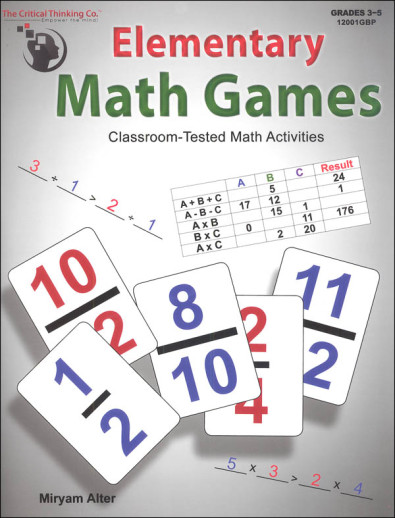We use cookies to make your experience better. To comply with the new e-Privacy directive, we need to ask for your consent to set the cookies. Learn more.
Elementary Math Games
I am a big fan of Critical Thinking Press products, and this is another good resource to add to your curriculum supplements. Elementary Math Games is a collection of games for the 3rd to 5th grade crowd to help reinforce the math learning that is already taking place with your curriculum. Most games require the use of pencil, paper, a pair of dice, or a game spinner. You will also need access to a random number generator. The front of the book offers some web link suggestions for these. There are 20 games in the book, all reproducible for repeated or group use. Included is a list of materials (including the pages you will need to copy), standards met, an overview of the game, and directions. There are games to practice greater than/less than, practice with the four basic functions, fractions and decimals, odds & evens, and much more. Playing math games not only offers application practice, but they help students with reasoning skills and mental math. Play Math! 152 pgs, p/b. ~ Donna
Spark the interest of even the most indifferent math student! There are 20 games in the Grades 3-5 book. The games build number sense, operational fluency, problem-solving strategies and give teachers and parents an alternative method to assess student performance and understanding. The math concepts and skills covered in each game are listed under each game, so teachers can select the appropriate games for the curriculum they are teaching.
Most of the games require only pencil, paper, and a pair of dice or a spinner. Each game has been classroom-tested numerous times and comes with clear, concise instructions and all reproducible master sheets necessary for playing. Instructions include a simple way to play a less challenging variation of the game or a more challenging variation. Instructions also include questions for further discovery, as well as, technology tips and teacher-management tips.
These games are also very helpful assessment tools since students love the games and are not reluctant to ask for help, because it improves their chances of winning the game. It is also common to hear students discuss and share their strategies with their peers. A study of the latest educational research has corroborated that there are a myriad of ways that games help children become proficient math learners.
- Meaningful situations for the application of mathematical skills
- Motivation children enjoy playing
- Positive attitude games reduce the fear of failure and error
- Increased learning increased interaction between children and more opportunities to test intuitive ideas and problem solving strategies
- Different levels games allow children to operate at different levels of thinking
- Assessment children's thinking becomes apparent through actions and decisions they make during a game
Concepts for Grades 3-5
- Number Sense
- Operational Skills
- Place Value
- Decimals
- Fractions
- Characteristics of Numbers: Multiples and Factors, Prime and Composite Numbers, Perfect Squares
- Math Vocabulary and Symbols
- Formulating Math Problem-Solving Strategies
| Product Format: | Paperback |
|---|---|
| Brand: | Critical Thinking Company |
| Grades: | 3-5 |
| ISBN: | 9781601449320 |
| Length in Inches: | 11 |
| Width in Inches: | 8.5 |
| Height in Inches: | 0.5 |
| Weight in Pounds: | 1.2 |

